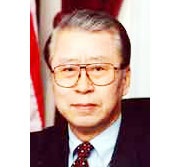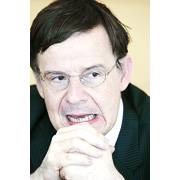When President-elect Park Geun-hye announced her presidential transition team, each member surprised many people. Some were not so well-known or surprise picks that went against people’s expectations. What caught my eye was a critical article pointing out that four of the 24 members were “children of the Yushin regime,” those whose fathers or fathers-in-law were high-ranking officials during that period. Yushin is the period under military control when President Park Chung-hee seized power, who was the father of the President-elect.
One of the transition team members’ fathers served as defense minister under the late President Park. Another members’ father graduated from the Korea Military Academy and was the secretary general of the Korean Red Cross, another was a four-term congressman of the Democratic Republican Party and another was a former congressman of the Grand National Party.
This article reminded me of a female candidate from a minor party and her obnoxious remarks during a presidential debate. She said that the daughter of Park Chung-hee should not become president and that she ran only to prevent Park from winning the election.
After watching people making an issue out of the people’s fathers’ past, not just for a presidential candidate but also for members of her transition team, I cannot help talking about the U.S.
The father of President Obama is from Kenya but I have never heard any derogatory remarks about that fact.
What is wrong with having a father who was the head of a ministry during the Yushin regime? Why should the deceased father of a candidate become an issue? We should get rid of this bad habit. I do not know why we dig up the past like this.
Considering what is happening, Obama would never have become president in Korea. It is time for Koreans to grow up.
There is also a difference between Korea and the U.S. in the formation and the operation of a presidential transition team. In America, presidential candidates select the key members of their transition team in the middle of their campaigns, well before the election is over and the result is announced. In the Obama transition team, Bill Clinton’s White House Chief of Staff, John Podesta, was assigned to the most important position, chairman of the team.
The official transition started on the first day when Obama was declared as the President-elect. The transition team estimated that it would hire 450 people for the process and set a $12 million budget. The government paid $5.2 million and the rest was raised through private donations. The transition team was formed through recommendations from the 12 members of the previously-appointed advisory board.
As the major role of the 12 members of the advisory board was to recommend outside candidates for the Cabinet, none of the members became secretary of a department. Only an extremely small number of them were left as White House staff, which was an exceptionally rare case.
Former President George W. Bush also selected the 14 members of his transition team in mid-October at the height of the presidential race as did Republican candidate Mitt Romney and the team was dismissed after the election, at the end of November.
In Korea, becoming a member of a presidential transition team was regarded as important by itself, since its members have an excellent chance to hold high positions in the newly-formed administration. For the same reason, the members were very arrogant, as if they had already become heads of ministries. As a result, many conflicts and negative side-effects occurred. But this time, it looks different. It seems to have become closer to how things are in the U.S. It set an example to follow for the team to carry out its job as planned despite criticism of “sealed nominations” or “nominations without discussion” by the opposition party.
In the end, a presidential transition team is up to the president-elect, and there are no rules they have to follow. A Korean
president-elect does not have to follow the American example. They should just follow what seems fit in Korea. But in the U.S., no matter who is selected for the transition team, their role is to select nominees for administrative offices and set the framework of the organization. There are almost no cases where a member of a transition team has become the secretary of a department in the U.S. Furthermore, people accept that the selection of the key members of the transition team is up to the president-elect. Hence, it is difficult to find the press arguing over the selection of a presidential transition team in the U.S.
Jay Kim is a former U.S. congressman. He serves as chairman of the Kim Chang Joon US-Korea Foundation. For more information, visit Kim’s website at www.jayckim.com.When President-elect Park Geun-hye announced her presidential transition team, each member surprised many people. Some were not so well-known or surprise picks that went against people’s expectations. What caught my eye was a critical article pointing out that four of the 24 members were “children of the Yushin regime,” those whose fathers or fathers-in-law were high-ranking officials during that period. Yushin is the period under military control when President Park Chung-hee seized power, who was the father of the President-elect.
One of the transition team members’ fathers served as defense minister under the late President Park. Another members’ father graduated from the Korea Military Academy and was the secretary general of the Korean Red Cross, another was a four-term congressman of the Democratic Republican Party and another was a former congressman of the Grand National Party.
This article reminded me of a female candidate from a minor party and her obnoxious remarks during a presidential debate. She said that the daughter of Park Chung-hee should not become president and that she ran only to prevent Park from winning the election.
After watching people making an issue out of the people’s fathers’ past, not just for a presidential candidate but also for members of her transition team, I cannot help talking about the U.S.
The father of President Obama is from Kenya but I have never heard any derogatory remarks about that fact.
What is wrong with having a father who was the head of a ministry during the Yushin regime? Why should the deceased father of a candidate become an issue? We should get rid of this bad habit. I do not know why we dig up the past like this.
Considering what is happening, Obama would never have become president in Korea. It is time for Koreans to grow up.
There is also a difference between Korea and the U.S. in the formation and the operation of a presidential transition team. In America, presidential candidates select the key members of their transition team in the middle of their campaigns, well before the election is over and the result is announced. In the Obama transition team, Bill Clinton’s White House Chief of Staff, John Podesta, was assigned to the most important position, chairman of the team.
The official transition started on the first day when Obama was declared as the President-elect. The transition team estimated that it would hire 450 people for the process and set a $12 million budget. The government paid $5.2 million and the rest was raised through private donations. The transition team was formed through recommendations from the 12 members of the previously-appointed advisory board.
As the major role of the 12 members of the advisory board was to recommend outside candidates for the Cabinet, none of the members became secretary of a department. Only an extremely small number of them were left as White House staff, which was an exceptionally rare case.
Former President George W. Bush also selected the 14 members of his transition team in mid-October at the height of the presidential race as did Republican candidate Mitt Romney and the team was dismissed after the election, at the end of November.
In Korea, becoming a member of a presidential transition team was regarded as important by itself, since its members have an excellent chance to hold high positions in the newly-formed administration. For the same reason, the members were very arrogant, as if they had already become heads of ministries. As a result, many conflicts and negative side-effects occurred. But this time, it looks different. It seems to have become closer to how things are in the U.S. It set an example to follow for the team to carry out its job as planned despite criticism of “sealed nominations” or “nominations without discussion” by the opposition party.
In the end, a presidential transition team is up to the president-elect, and there are no rules they have to follow. A Korean
president-elect does not have to follow the American example. They should just follow what seems fit in Korea. But in the U.S., no matter who is selected for the transition team, their role is to select nominees for administrative offices and set the framework of the organization. There are almost no cases where a member of a transition team has become the secretary of a department in the U.S. Furthermore, people accept that the selection of the key members of the transition team is up to the president-elect. Hence, it is difficult to find the press arguing over the selection of a presidential transition team in the U.S.
Jay Kim is a former U.S. congressman. He serves as chairman of the Kim Chang Joon US-Korea Foundation. For more information, visit Kim’s website at www.jayckim.com. <The Korea Times/Jay Kim>


